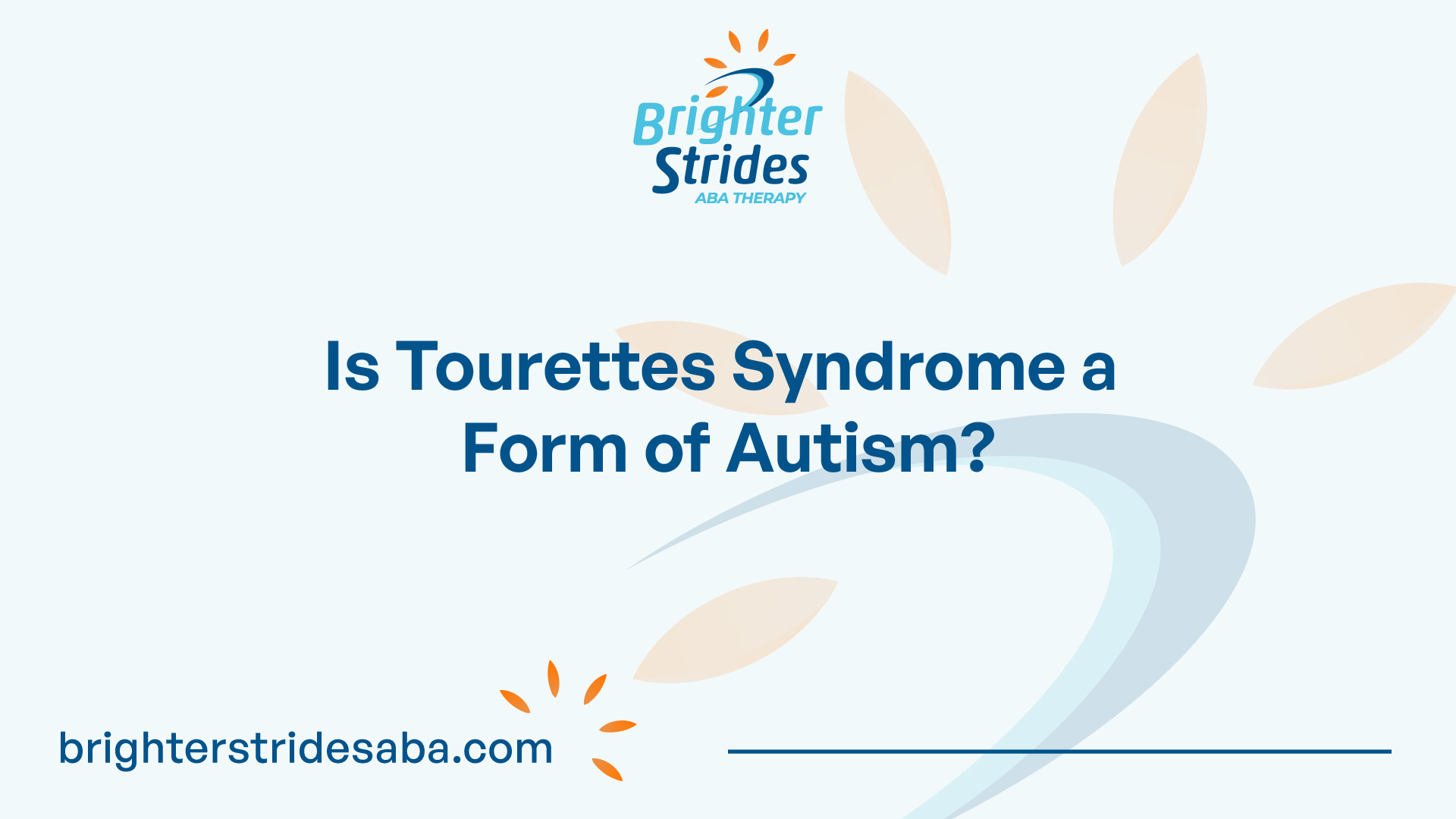Understanding Tourette Syndrome
Tourette Syndrome (TS) is a neurological disorder characterized by the presence of rapid, repetitive movements or sounds known as tics. These tics are difficult to control and can vary in their frequency, intensity, and complexity. TS is one of a group of disorders known as tic disorders, which affect the development of the nervous system.

What is Tourette Syndrome?
Tourette Syndrome is a developmental disorder that typically emerges between the ages of 5 and 10 years. It is characterized by the presence of both motor tics and vocal tics. Motor tics involve sudden, involuntary movements of specific muscle groups, while vocal tics are rapid, repetitive vocalizations. Motor tics usually precede the development of vocal tics.
Individuals with Tourette Syndrome may experience a variety of tics, such as eye blinking, head jerking, shoulder shrugging, throat clearing, or repetitive sounds. The severity and frequency of tics can vary among individuals, and they may change over time. It is important to note that tics are not voluntary and are often preceded by premonitory sensations, similar to the urge before needing to itch or sneeze. These sensations are relieved only after the tic is carried out.
Symptoms of Tourette Syndrome
In addition to tics, individuals with Tourette Syndrome may experience other associated symptoms. These can include obsessive-compulsive disorder (OCD), attention deficit hyperactivity disorder (ADHD), or learning difficulties. However, it’s important to note that these symptoms are not exclusive to Tourette Syndrome and can also occur independently.
The symptoms of Tourette Syndrome can have varying impacts on an individual’s daily life. Some individuals may experience mild tics that do not significantly interfere with their functioning, while others may have more severe tics that can affect social interactions, academic performance, or quality of life. It is crucial to provide support and understanding to individuals with Tourette Syndrome to help them manage their symptoms and navigate any challenges they may face.
By understanding the nature of Tourette Syndrome and its associated symptoms, we can foster a greater sense of empathy and support for individuals living with this neurological condition.
Differentiating Tourette Syndrome and Autism
When discussing neurological conditions, it’s essential to differentiate between Tourette Syndrome (TS) and Autism Spectrum Disorder (ASD). While there may be some overlap in symptoms and co-occurrence, TS is not considered a form of autism. Let’s explore the unique characteristics of Tourette Syndrome and the key features of Autism Spectrum Disorder.
Tourette Syndrome: A Unique Condition
Tourette Syndrome is a neurological disorder characterized by repetitive, involuntary movements and vocalizations known as tics. These tics can manifest as sudden, rapid, and repetitive actions or sounds. They typically start during childhood, between the ages of 2 and 14, with the average onset occurring around 6 years old.
The tics associated with Tourette Syndrome can vary in frequency, intensity, and complexity. They may wax and wane over time, with periods of increased tic activity followed by periods of relative calm. While tics are the hallmark of TS, individuals with the condition may also experience other associated symptoms, such as obsessive-compulsive behaviors, attention deficit hyperactivity disorder (ADHD), and difficulties with impulse control.
Autism Spectrum Disorder: Key Features
On the other hand, Autism Spectrum Disorder (ASD) is a developmental disorder characterized by challenges with social skills, communication difficulties, and repetitive behaviors. It is not directly associated with Tourette Syndrome, as they are distinct conditions with different symptoms, diagnostic criteria, and treatment approaches.
Individuals with ASD may have difficulties with social interactions, understanding social cues, and forming meaningful relationships. They may engage in repetitive behaviors or have intense, specific interests. Communication difficulties are also common in individuals with ASD, ranging from delayed language development to challenges with non-verbal communication.
While some individuals with Tourette Syndrome may exhibit symptoms similar to ASD, such as repetitive movements, it’s important to note that these behaviors are related to tics rather than being part of the core symptoms of Autism Spectrum Disorder. It’s crucial to make a proper diagnosis to ensure appropriate support and intervention for individuals with these conditions.
By understanding the unique characteristics of Tourette Syndrome and Autism Spectrum Disorder, we can differentiate between these two distinct neurological conditions. Although they may co-occur in some individuals, having one condition does not automatically mean having the other. It’s essential to seek professional evaluation and guidance to accurately diagnose and address the specific needs of individuals with these conditions.
The Relationship Between Tourette Syndrome and Autism
Tourette Syndrome (TS) and Autism Spectrum Disorder (ASD) are two distinct neurological conditions. Although they are separate conditions, they can co-occur in individuals. It is important to understand the relationship between Tourette Syndrome and Autism to provide accurate diagnoses and develop comprehensive treatment plans.
Co-Occurrence of Tourette Syndrome and Autism
It is common for individuals with Tourette Syndrome to also have Autism, although Tourette Syndrome is not considered a form of Autism. The estimated rate of co-occurrence between Tourette Syndrome and Autism Spectrum Disorder ranges from 5% to 85%. This co-occurrence can lead to more complex presentations that may require a multidisciplinary approach to treatment, involving medical, behavioral, and therapeutic interventions.
Genetic Overlap and Shared Risk Factors
Research suggests a potential genetic link between Tourette Syndrome and Autism Spectrum Disorder. Specific genes have been identified in both conditions, indicating a shared genetic basis [5]. Studies analyzing data from individuals with Autism, Attention Deficit Hyperactivity Disorder (ADHD), and Tourette Syndrome have found significant genetic overlap, indicating shared genetic risk factors among these conditions.
The genetic variants associated with Autism may also play a role in Tourette Syndrome and ADHD, suggesting a potential spectrum linking these conditions. This overlap and shared genetic factors contribute to the complexity of the relationship between Tourette Syndrome and Autism.
Understanding the co-occurrence and genetic overlap between Tourette Syndrome and Autism is crucial in providing comprehensive care for individuals with these conditions. By recognizing the shared features and considering the potential impact on social functioning, sensory sensitivity, and emotional regulation, healthcare professionals can tailor interventions and support services to meet the unique needs of individuals with both Tourette Syndrome and Autism.
Clinical Presentation and Challenges
When examining the relationship between Tourette Syndrome (TS) and Autism Spectrum Disorder (ASD), it becomes evident that there are overlapping symptoms and behaviors, as well as significant impact on social functioning and daily life.
Overlapping Symptoms and Behaviors
Individuals with both TS and ASD may experience a range of overlapping symptoms and behaviors. These can include heightened sensory sensitivity, social challenges, executive functioning deficits, and difficulties with emotional regulation. While TS and ASD are distinct conditions with their own diagnostic criteria, understanding the connection between them is crucial for accurate diagnosis and comprehensive treatment planning.
It is important to note that the presence of tics alone does not necessarily indicate a diagnosis of ASD. However, in some cases, tics can be one of several features that contribute to an ASD diagnosis. A comprehensive evaluation by healthcare professionals familiar with both conditions is essential to differentiate between TS, ASD, and the co-occurrence of the two.
Impact on Social Functioning and Daily Life
The co-occurrence of TS and ASD can lead to more complex presentations, resulting in challenges related to social functioning and daily life. Difficulties with social interactions, communication, and understanding social cues can be compounded by the presence of tics and associated symptoms of ASD. These challenges can significantly impact relationships, academic performance, and overall quality of life.
Individuals with TS and co-occurring ASD may benefit from a multidisciplinary approach to treatment. This approach involves addressing both the tics and associated symptoms of ASD. Behavioral therapies, such as cognitive-behavioral therapy and social skills training, can be helpful in improving social interactions and communication skills. Medications may also be prescribed to manage tics and associated symptoms, such as attention difficulties or anxiety. Additionally, support services tailored to the individual’s unique needs and challenges can enhance their quality of life and social functioning.
By understanding the overlapping symptoms and challenges associated with TS and ASD, healthcare professionals can provide comprehensive assessments and develop individualized treatment plans. The goal is to improve the social functioning and overall well-being of individuals with these conditions, empowering them to thrive in their daily lives.
Diagnosis and Management
When it comes to diagnosing and managing Tourette Syndrome (TS), it is important to understand the specific diagnostic criteria and the comprehensive treatment approaches available.
Diagnostic Criteria for Tourette Syndrome
The diagnosis of Tourette Syndrome is typically made based on the presence of both motor and vocal tics, which have been present for at least one year, according to the Centers for Disease Control and Prevention (CDC). Tics are sudden, repetitive, and nonrhythmic movements or sounds that can vary in intensity and frequency. These tics often begin during childhood, typically between the ages of 2 and 14, with the average onset around 6 years old.
It’s important to note that tics and other symptoms of Tourette Syndrome may improve over time and may even disappear completely in some cases. However, individuals with Tourette Syndrome may experience mood and behavioral problems, and children with this condition could be at risk of bullying due to their tics potentially singling them out.
Comprehensive Treatment Approaches
While there is no cure for Tourette Syndrome, there are various treatment approaches available to help manage symptoms and improve quality of life. The treatment plan for Tourette Syndrome is often individualized and may involve a combination of therapies and interventions.
Medication may be prescribed to help manage tics and associated symptoms. These medications can help reduce the frequency and intensity of tics, allowing individuals to better control their movements and sounds. However, it’s important to work closely with a healthcare professional to determine the most appropriate medication and dosage, as each person’s response to medication may vary.
In addition to medication, behavioral therapy and cognitive-behavioral therapy (CBT) can be beneficial for individuals with Tourette Syndrome. Behavioral therapy helps individuals recognize and manage their tics and develop coping strategies. CBT, on the other hand, focuses on addressing any associated anxiety, depression, or other psychological challenges that may arise.
For some individuals with severe and debilitating symptoms, deep brain stimulation (DBS) may be considered as a treatment option. DBS involves implanting electrodes in specific areas of the brain and delivering electrical impulses to modulate abnormal brain activity. It is a more invasive procedure and is typically reserved for those who have not responded well to other treatments.
Clinical research and participation in clinical trials are encouraged to advance the understanding and treatment of Tourette Syndrome. These studies contribute to ongoing efforts to develop new and more effective treatments for Tourette Syndrome.
By following a comprehensive treatment approach that combines medication, behavioral therapy, and other interventions, individuals with Tourette Syndrome can better manage their symptoms and improve their overall quality of life. Regular communication and collaboration with healthcare professionals are essential to tailor the treatment plan to the individual’s specific needs and goals.
Tourette Syndrome and Autism: What Research Says
As the question of whether Tourette Syndrome (TS) is a form of autism arises, it is essential to clarify that Tourette Syndrome is not considered a form of autism. Tourette Syndrome is classified as a separate neurological condition characterized by repetitive, involuntary movements and vocalizations known as tics, according to Stanford Health Care.
Genetic Studies and Associations
However, research indicates that Tourette’s syndrome commonly co-occurs with autism spectrum disorder (ASD), with the estimated rate of co-occurrence ranging from 5% to 85%. This co-occurrence suggests there may be a genetic link between Tourette’s syndrome and autism spectrum disorder, as both conditions have been linked to specific genes. Genetic studies have identified certain genetic variants associated with autism that may also play a role in Tourette’s syndrome, indicating a shared genetic basis among these conditions [6].
Prevalence and Patterns of Co-Occurrence
The co-occurrence of Tourette’s syndrome and autism can lead to more complex presentations that require a multidisciplinary approach to treatment. It is observed that more than half of individuals with Tourette syndrome also have obsessive-compulsive disorder (OCD) or attention deficit hyperactivity disorder (ADHD), and up to 20% have autism. These conditions share impulsive and compulsive behaviors, suggesting a potential continuum or spectrum between ADHD, OCD, autism, and Tourette syndrome.
A study analyzing data from previous studies involving a total of 93,294 individuals with at least one of the four conditions (autism, ADHD, Tourette syndrome, OCD), along with 51,311 controls, discovered significant genetic overlap between autism, ADHD, and Tourette syndrome. This finding suggests shared genetic risk factors among the three conditions, further supporting the notion of a potential spectrum or genetic connection between them.
Understanding the relationship between Tourette’s syndrome and autism is crucial for accurate diagnosis and comprehensive treatment planning. The co-occurrence of these conditions may impact clinical presentation, requiring tailored interventions and support services. A multidisciplinary approach involving medical, behavioral, and therapeutic interventions is often necessary to address the complexity of symptoms and challenges associated with both Tourette’s syndrome and autism.
Supporting Individuals with Tourette Syndrome and Autism
When individuals are diagnosed with both Tourette Syndrome (TS) and Autism Spectrum Disorder (ASD), a comprehensive approach to treatment and support is essential. The co-occurrence of these conditions may lead to more complex presentations that require a multidisciplinary treatment approach involving medical, behavioral, and therapeutic interventions.
Multidisciplinary Treatment Approaches
Treating individuals with both Tourette Syndrome and Autism Spectrum Disorder requires a collaborative effort from various professionals, including medical doctors, psychologists, therapists, and educators. A multidisciplinary approach ensures that all aspects of the individual’s needs are addressed comprehensively.
The treatment plan may include:
- Medication: Medical professionals may prescribe medications to manage symptoms associated with both Tourette Syndrome and Autism Spectrum Disorder. Medications can help reduce tics, manage co-occurring conditions like ADHD, anxiety, and mood disorders, and improve overall functioning.
- Behavioral Interventions: Behavioral interventions play a crucial role in supporting individuals with Tourette Syndrome and Autism Spectrum Disorder. Behavioral therapies, such as Applied Behavior Analysis (ABA) and Cognitive-Behavioral Therapy (CBT), can help individuals develop coping strategies, improve social skills, and manage challenging behaviors.
- Therapeutic Interventions: Therapies such as Occupational Therapy (OT), Speech Therapy, and Sensory Integration Therapy can address sensory sensitivities, improve communication skills, and enhance motor skills. These interventions are tailored to meet the unique needs of individuals with Tourette Syndrome and Autism Spectrum Disorder.
Tailored Interventions and Support Services
Individuals with both Tourette Syndrome and Autism Spectrum Disorder may experience a range of challenges, including heightened sensory sensitivity, social difficulties, executive functioning deficits, and difficulties with emotional regulation [5]. Tailored interventions and support services can help address these challenges effectively.
- Individualized Education Plans (IEPs): In an educational setting, individuals with Tourette Syndrome and Autism Spectrum Disorder may benefit from an Individualized Education Plan. This plan outlines specific accommodations, modifications, and support services required to optimize their learning experience and academic success.
- Social Skills Training: Social skills training programs can provide individuals with strategies to improve their social interactions, enhance communication skills, and navigate social situations more effectively. These programs may be conducted in group settings or through individual therapy sessions.
- Support Groups: Engaging in support groups can provide individuals with Tourette Syndrome and Autism Spectrum Disorder, as well as their families, a sense of community and understanding. These groups offer a platform to share experiences, gain support, and learn from others facing similar challenges.
By implementing a multidisciplinary treatment approach and tailored interventions, individuals with both Tourette Syndrome and Autism Spectrum Disorder can receive the support they need to navigate daily life successfully. It’s important to work closely with healthcare professionals, educators, and therapists to develop an individualized plan that addresses the unique needs of each person.
Living with Tourette Syndrome
Living with Tourette Syndrome (TS) can present unique challenges, but understanding the symptoms and developing coping strategies can greatly improve daily life. This section will explore two important aspects of living with Tourette Syndrome: understanding tics and other symptoms, and developing coping strategies and support networks.
Understanding Tics and Other Symptoms
Tics are the hallmark feature of Tourette Syndrome. They are sudden, rapid, repetitive movements or vocal sounds that are involuntary and often difficult to control. Tics can vary in frequency, intensity, and complexity, and may change over time. Common motor tics include eye blinking, head jerking, shoulder shrugging, and facial grimacing. Vocal tics can manifest as throat clearing, grunting, sniffing, or repetitive words or phrases.
In addition to tics, individuals with Tourette Syndrome may experience other symptoms. Many individuals report premonitory sensations, which are uncomfortable feelings or urges that precede a tic. These sensations are likened to the urge before needing to itch or sneeze, and they are relieved only after the tic is carried out [3].
It is important to note that Tourette Syndrome is a highly variable condition, and not all individuals will experience the same combination or severity of symptoms. Understanding these symptoms can help individuals and their loved ones better navigate the challenges associated with TS.
Coping Strategies and Support Networks
Coping with Tourette Syndrome involves developing strategies to manage tics and minimize their impact on daily life. Here are some coping strategies that individuals with TS may find helpful:
- Awareness and self-monitoring: Developing self-awareness of tic triggers and sensations can help individuals anticipate and manage their tics. Keeping a tic diary or using a smartphone app can assist in identifying patterns and potential triggers.
- Relaxation techniques: Practicing relaxation techniques, such as deep breathing exercises, mindfulness, or yoga, can help reduce stress and anxiety, which can sometimes exacerbate tics.
- Education and advocacy: Learning about Tourette Syndrome and educating others can help create understanding and support. Advocacy organizations and support groups can provide valuable resources and connect individuals with TS to a supportive community.
- Medication and therapy: In some cases, medication may be prescribed to manage tics or associated conditions like ADHD or anxiety. Behavioral therapy, such as Cognitive Behavioral Intervention for Tics (CBIT), can also be beneficial in teaching techniques to manage tics and reduce their impact.
- School and workplace accommodations: Individuals with Tourette Syndrome may benefit from accommodations in educational or work settings. This can include flexible schedules, access to quiet spaces, or the use of assistive technologies.
Support networks play a vital role in the lives of individuals with Tourette Syndrome. Connecting with others who understand the challenges of TS can provide a sense of belonging and emotional support. Support groups, both in-person and online, offer opportunities to share experiences, exchange advice, and learn coping strategies from others facing similar journeys.
Living with Tourette Syndrome requires patience, understanding, and a multidimensional approach to management. By gaining knowledge, utilizing coping strategies, and accessing support networks, individuals with TS can lead fulfilling lives while navigating the unique aspects of their condition.
References
- https://www.cdc.gov/ncbddd/tourette/diagnosis.html
- https://www.ninds.nih.gov/health-information/disorders/tourette-syndrome
- https://www.nhs.uk/conditions/tourettes-syndrome/
- https://www.tourettes-action.org.uk/storage/downloads/1610981978_Tourette’s-&-Autism-article.pdf
- https://www.autismparentingmagazine.com/connection-between-tourettes-autism/
- https://www.spectrumnews.org/news/common-variants-link-autism-adhd-tourette-syndrome/




